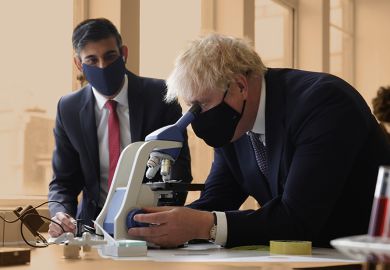Politicians need to “get serious” about declining university funding, but institutions must drive efficiency and ask themselves if there are “things we could potentially not do” to advance a “bigger conversation” on the sector’s future, according to the Universities UK president.
Steve West, the University of the West of England vice-chancellor, made the comments at Times Higher Education’s THE Campus Live event in London, as universities await an autumn statement from the UK government that could deliver cuts to both research and teaching budgets.
With universities in England under pressure from a lengthy tuition fee freeze, Professor West repeated his call for a “national conversation” with government and society on the future funding of higher education across the UK, calling for a “cross-government” look at the issue, including the House of Commons and House of Lords “coming together” to examine funding.
The issue was “too important” for continued changes at the margins, he said. “So they [politicians] need to get round the table and get serious.”
He added: “If we’re having a conversation with government about the possibilities of future funding and with society as a whole, we’ve got to be able to demonstrate we are efficient, effective and we’ve got high productivity.
“I would argue…that we need to look harder to our institutions and ask ourselves, can we tick all of those boxes or are there things we can do differently, are there things we could potentially not do. That would help us then create a different financial landscape within our institutions.”
“If we don’t do that we’re not going to get very far in a bigger conversation,” he added.
On the UK’s hopes of associating to Horizon Europe, Professor West said the “clock is ticking”, which means UK universities are “seeing our researchers start to move away from our institutions” to continental Europe and UK researchers missing out on taking the lead on projects.
“That will be a problem,” he added. “We need to find a solution quickly.”
On the broader political debates around higher education, Professor West said universities must “make it real” for members of the public and connect with those who have not attended university.
“That will take some of the pressure off our politicians,” he added. “At the moment the politicians are playing quite a clever game.”
He went on: “One of my worries is there’s debate that’s starting: ‘why do we need graduates in dot, dot, dot’,” he added. That debate is “now moving into spaces like nursing, teaching, social work – that’s very dangerous”, he continued.
Universities have “lost some of the narrative” around explaining why graduates “are important for the health, wealth and prosperity of the nation,” he said. “Research can spin into that as well.”
Professor West continued: “We have to explain it in a way people can recognise and get emotional about it. We tend to hold back rather than saying: when you’re on the roadside and you’ve just been knocked down, you want the most highly educated person dealing with your injuries. Graduate paramedics provide you with a chance.”
He added: “It’s those sorts of narratives that we need to start using in a way perhaps we’ve shied away from. Because that’s the narrative the politicians use in a different direction sometimes.”
On the idea of reintroducing student number controls, seen as a potential measure the government could take to control spending, or by some as a route to securing a better funding settlement, Professor West said: “Putting student number controls will go to the heart of…disadvantage. It’s those groups of students who will be absolutely hit. And that for me is a crime.”
Register to continue
Why register?
- Registration is free and only takes a moment
- Once registered, you can read 3 articles a month
- Sign up for our newsletter
Subscribe
Or subscribe for unlimited access to:
- Unlimited access to news, views, insights & reviews
- Digital editions
- Digital access to THE’s university and college rankings analysis
Already registered or a current subscriber?








